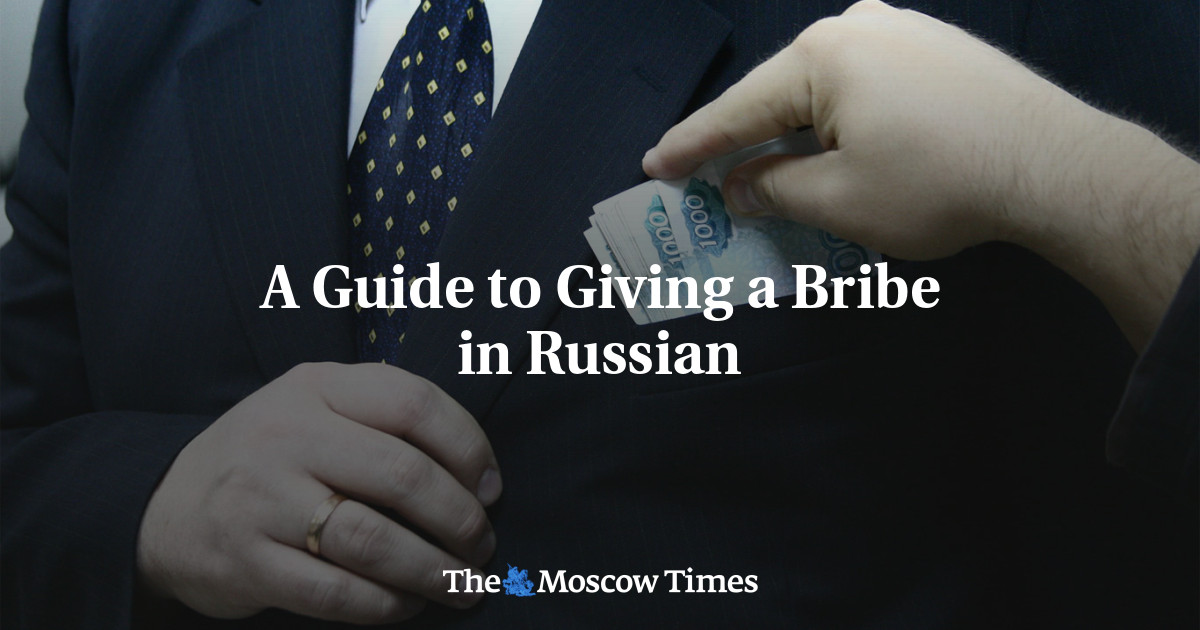
Давать на лапу: to grease someone’s palm
The other day someone asked me if I’d ever written about the language of bribe-giving. I haven’t. In fact, I don’t think I ever offered a bribe, although in the days before Moscow installed about a million predatory street cameras that fine you online, гаишники (traffic cops, aka the hounds of hell) sometimes demanded them from me. Since their trick was to take your passport and license and refuse to give them back until you paid your “fine,” I paid. Once it was for a supposedly illegal painted bumper, a “violation” so ludicrous that even the cop’s partner snorted with laughter.
As it turns out, you don’t have to look far for bribe-talk. Everything you want to know about bribes, including slang expressions, can be found on the Moscow Government web site. The section welcomes readers with a warm opening sentence: Есть такая старая русская традиция — взятка (There is an old Russian tradition — the bribe).
The person giving the bribe is взяткодатель (bribe-giver) and the person taking it is взяткополучатель or, more commonly, взяточник (bribe-taker). According to studies — perhaps conducted by potential bribe-givers: Взяточник — это чаще всего мужчина в возрасте от 25 до 40 лет, с высшим образованием, состоящий в браке и имеющий детей на иждивении (A bribe-taker is typically a man aged 25 to 40, with a higher education, married with dependent children).
When you give this guy a bribe, you are not likely to say: На — возьми взятку (Here’s a bribe; take it). Instead you might say you are giving him something to express gratitude (выражать благодарность). To your friend you might say you had to buy someone off (откупаться). Or you might use the slangy давать на лапу (literally to put something in his paw).
I asked some of my Russian friends to think back to their bribing days, and we came up with three situations in the Soviet and immediate post-Soviet period where you were likely to give a bribe.
The first category was the communal services guys. This was local слесарь Вася (plumber Vasya) who, like all plumbers, was always drunk — this apparently was a job qualification. That did not stop him from doing excellent work, although it did make it hard to reach him sometimes.
These folks got a salary, but it wasn’t what you’d call generous. Many of these people came to Moscow from other towns по лимиту (as migrant workers), lived in horrible conditions, waited for a Moscow прописка (residence permit) and eventually housing. So Вася needed to make as much money on the side — in part to pay bribes in various offices to speed up his residency permit. To make sure your toilet got fixed within the millennium, you might say, Конечно, я вас поблагодарю (Of course I’ll thank you). But sometimes you just cut to the chase and asked: Сколько? (How much?)
Doctors, teachers, secretaries, and gatekeepers (to officials, important bosses, or service providers) also got bribes. A doctor friend got what he called джентельменский набор: коньяк, конфетки, блок (иностранных) сигарет (a gentleman’s assortment: cognac, a box of candy and a carton of (foreign) cigarettes). A different friend wanted to bribe her teacher for a good grade. She slipped cash in the folder with her essay and said: Работу я сделала… может быть, договоримся? (I did the work… can we come to an agreement?)
A specialist in bribe-giving suggests first deciding how much you are willing to pay. Прикиньте какой суммы достаточно для того, чтобы этот человек соблазнился (Estimate what amount would be enough to seduce the person you’re bribing). Умножьте на два (Double the figure).
Then there are possible approaches. What you say depends on the situation. For the first category of someone you want something from — like the plumber or teacher — you’ve established there is a problem – a broken toilet, a possible bad grade – and are now presenting a range of possible solutions. That come in an envelope. Or large bag. Or suitcase.
Как решить вопрос? (How can we resolve this?) Может быть, мы поищем какой-нибудь вариант решения проблемы? (Maybe we can look for another way to resolve the problem?) Давайте посмотрим на вопрос с другой стороны! (Let’s look at this issue from another angle!) Or even: У меня к вам рационализаторское предложение! (I’ve got a labor-saving proposal for you!)
It’s not clear whose labor is being saved, but you get your idea across.
If it’s a traffic cop or anyone in authority about to fine, charge, arrest or otherwise make your life miserable, then the question is slightly different. Договориться можно? (Can we make a deal?)
What if the cop, investigator, prosecutor, or other person in authority responds with outrage? You have two options. One is to play innocent: Да что вы, что вы! Я совсем не это имел в виду (Good grief! How could you say that?! I didn’t mean that at all!) The other is to realize that you low-balled your offer and try again: Что я для вас могу сделать? (What can I do for you?)
And then there a third category that is, frankly, way above my pay grade. This is big business, heads of construction boards, lawmakers considering legislation that could either break you or make you, and other top-level officials with the power to nix or okay your billion-dollar deal. I have been told that words are usually not uttered. In some cases a number is written on a scrap of paper and passed across a desk or, more likely, across a crisp white tablecloth in an expensive restaurant. Or the terms were clarified by minions at an earlier date and the only reference to an expected large transfer of funds from one off-shore account into another might be: Условия знаете? (You know the terms?)
But that’s out of my league. I’m still angry about the $50 I paid for my painted bumper.
Leave a Reply